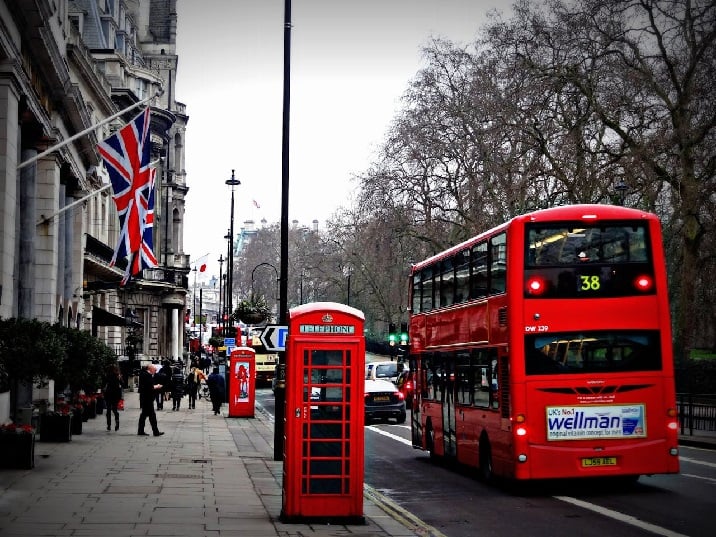I Overstayed My Visa in the UK, Can I Return?
If you have previously stayed in the UK past the validity period of your visa, your eligibility to obtain another visa to return may be affected.
Dealing with a past or present overstay can be a daunting process and you might find that you aren’t able to get another visa for the UK. The exact repercussions of an overstayed visa in the UK may vary depending on your circumstances and expert advice may be the best way to understand your options. Our specialist team of Immigration Lawyers at IAS can help you with this. You can call us today at +44 (0)333 414 9244 or make an online enquiry to receive help with your situation.
Read our 1001 reviews
How Does Overstaying Affect My Ability to Return to the UK?
Whether you will be able to return after overstaying in the UK depends on your circumstances. If you overstayed while waiting for the Home Office to process your visa extension, were denied, but left immediately after you received this refusal, then you might be able to return to the UK without significant consequences. The same might be true if you left the UK voluntarily within 30 days after your visa expiry deadline which would still make you an overstayer but likely wouldn’t affect your ability to return to the UK on a valid visa.
If you did not leave the UK within the initial 30-day grace period after your visa expired, then you might have trouble coming back to the UK as stricter consequences include re-entry bans that can last from one to ten years, as well as fines or even imprisonment.
The following factors may determine whether your overstay will affect your ability to return to the UK:
- When you left the UK in relation to your visa expiry date
- Whether you left out of your own volition or had to be forcibly removed (deported)
- Whether you had the financial means to pay for your travel back to your home country or if the government incurred costs to send you back
- Whether you were a legal adult in the UK (individuals who overstayed before they were 18 years old will usually not face re-entry bans)
If you overstayed and faced repercussions, you may not be able to obtain a visa to return to the UK. However, you should note that individuals who are applying to return via a family or partner visa often won’t be barred from re-entry so if this is your situation, you might be fine.
If you overstayed on a standard visitor visa, student visa, or other temporary visa, you may have an especially hard time returning to the UK as overstaying on these visas beyond the grace period will negatively affect your chances of obtaining another visa for the UK afterwards. You should contact an experienced immigration lawyer as soon as possible to explore what steps you might take to improve your chances.
While an overstay should always be avoided, you might be able to return to the UK if you can prove that your overstay was caused by external circumstances beyond your control, such as a hospital stay or a prison stay, or a force majeure such as a natural catastrophe or war that prevented travel to your home country.
Circumstances like this will be considered on a case-by-case basis and while they are not a guarantee that you won’t face any consequences for overstaying your visa, being able to prove a good reason for your overstay may minimise its impact on your ability to return to the UK.
Legal Consequences of Overstaying That Affect Your Ability to Return to the UK
Staying when your UK visa expired is a criminal offence and a prosecutable matter that may directly affect future UK immigration applications through re-entry bans and by discrediting your status as a reliable individual who adheres to immigration policies.
While you may benefit from grace periods depending on circumstance, you should be aware that this is a serious matter. If you have overstayed a visa in the UK, it may be advisable to seek experienced legal support as soon as you can to mitigate any further repercussions that will limit your ability to return to the UK.
When you are given a re-entry ban due to overstaying, you will not be able to return to the UK until the ban period has expired. This may be only one year but can be up to ten years. Afterwards, you might still face some issues, as visa applications generally consider how likely an individual is to break UK immigration law.
Additional repercussions may include fees or even incarceration. The maximum duration of imprisonment used to be 6 months, but since 2022, it has been raised to up to four years. In 2024, further steps were implemented to ensure better tracking of visa overstays and immigration officials have been granted additional power to detain, meaning that an overstay is unlikely to go unnoticed.
If you want to return to the UK, you will need to make sure that all fines were paid and you might have to figure out how a prison sentence affected your eligibility for a new visa.
Returning after Voluntary Departure at Your Own Expense
If you overstayed by 90 days or more, you will automatically be met with a re-entry ban, which will have to run its course or be overturned before you may apply to return to the UK
The duration of this re-entry ban depends on your cooperation when needing to leave the UK after overstaying. If you agreed to leave voluntarily and at your own expense, you will usually face the minimum re-entry ban of only one year.
Returning after Voluntary Departure at the Secretary of State’s Expense
If you overstayed 90 days or more and cannot afford to leave the country even though you are willing to do so, or if your leaving otherwise causes costs incurred by the Secretary of State, you will be subject to a two-year re-entry ban.
You may benefit from support through an AVR (Assisted Voluntary Return) programme, but will still face this two-year ban from returning to the UK.
Returning after Passing the Six-Month Time Limit on Overstaying
If you want to return to the UK after overstaying, you should note that the two-year re-entry ban only applies to individuals who overstayed by less than 6 months. Passing this cut-off will lead to more severe consequences.
Depending on circumstances, this time limit might reset if a removal decision is officially changed or substituted, an appeal is lodged or dismissed, or additional submissions are made to the Secretary of State for consideration regarding pending removal decisions.
Five-Year Re-Entry Ban
If you fail to leave by the time the six-month period for the two-year re-entry ban has expired, you may still leave voluntarily at the Secretary of State’s expense but you will incur a mandatory five-year re-entry ban.
Returning after Being Deported
Returning to the UK after not cooperating when needing to leave as an overstayer will be more problematic. Individuals who do not voluntarily leave the UK are subject to a deportation order also referred to as enforced removal. Deportations are usually met with a mandatory ten-year re-entry band and can severely affect your chances of returning to the UK.
Record of Departure
After leaving the UK it is important that the date and the circumstances of your leave are noted as these will be relevant when considering your consequences and possibilities for future re-entry.
Applying for a Visa to Return to the UK after Overstaying
Obtaining a visa to return to the UK after a past overstay may be more difficult as a history of breaking UK immigration rules will negatively reflect on your eligibility as a visa candidate, if not ban you outright.
Depending on the circumstances of a past overstay you may be dealing with a re-entry ban, meaning that you will not be able to get a visa for the UK until this ban expires or you successfully appeal it. However, even after such a ban has expired, you might still struggle as eligibility considers how likely you are to adhere to immigration policies.
While you will need to make sure that you have a very strong application and that any past bans are no longer in effect, it is recommended that you seek additional support from an immigration specialist who will be able to better assist you on this journey.
At IAS, our immigration lawyers are experienced with the nuances of overstays and visa applications and will be able to help you with any step of the application or appeals process. You can call us today at +44 (0)333 414 9244 for immediate advice.
Returning After You Overstayed While Awaiting a Visa Decision
If you want to return to the UK after overstaying as you were awaiting a visa decision, you may be able to do so. The Home Office makes certain provisions for individuals who end up with an expired visa while they are waiting for a decision on an existing visa application.
In general, you will not be considered an overstayer if you filed for a new visa or a visa extension before your current permission expired. You will be allowed to stay in the UK until a decision is made without this counting as an overstay unless your application is declined in which case you should appeal or leave the country as soon as you can.
You should be aware that this only applies to valid visa applications. Should your application be found to contain misleading or incorrect information, or should you no longer meet the requirements for the visa you are applying for, your application may be found invalid. If this happens you will not be protected, making you an overstayer.

Returning with a Family Visa or Spouse Visa
While any overstay should be avoided, facing an overstay on a family or Spouse Visa will likely not lead to you being banned from re-entry. If you have previously overstayed and are hoping to come to the UK on one of these permissions, you will need to make sure that your application is strong and clearly proves your relationship and eligibility.
You will also retain some rights such as the ability to send your children to school until they are 16 years old. Additionally, you will be able to benefit from emergency services even if you have overstayed. This includes the police, fire services, or an ambulance.
If you were an overstayer on a family visa before you were 18, this will not count against you.
Mitigating Limitations on Your Ability to Return to the UK
While it is always best to avoid overstaying in the first place, there are some factors to consider if an overstay has already happened or will be inevitable. The Home Office allows for limited-time grace periods to either re-apply for a visa or to leave the country, providing that you had good reason.
Beyond this, it is good to remember that acting sooner rather than later and being willing to cooperate will give you the best possible outcome. Generally, the consequences of not leaving the UK are directly related to the duration of your overstay.
14-Day Rule on Overstaying
If you were planning to apply for another visa or a visa extension but failed to do so on time, you may benefit from a 14-day grace period after your current visa expires. You must file your visa application during this timeframe to avoid being considered an overstayer.
However, you should note that this is not a viable path to buy you a little extra time between visas as you will be expected to show adequate proof of ‘good reason’ meaning that there were circumstances out of your control that affected your ability to apply before your visa expired.
Your application is likely to be rejected if you overstay past this 14-day period, even if your circumstances provide you with a good reason.
30-Day Rule on Overstaying
While you are expected to leave the UK on or before the day that your visa expires, there is a 30-day grace period in which you may leave without being subject to further legal consequences.
You should note that you are expected to leave voluntarily and at your own expense. While you will still be considered an overstayer if you leave within this period, you will likely not face a re-entry ban.
What Is a Good Reason?
If your overstay was caused by circumstances that you couldn’t prevent, you might be able to argue that you had a good reason for the delay.
Such circumstances may include:
- Medical circumstances such as needing medical emergency treatment or needing essential care
- Sickness or loss of a close relative
- Flight cancellations or other travel delays caused by the transport provider
- Travel Restrictions or political instability in the country of your destination
- A natural disaster that prevents travel
- Waiting for a response from an educational institution
You should keep in mind that you will need to provide evidence of this. The Home Office does not remind visa holders of their departure dates and simply forgetting, not wanting to, or being too busy is not an excuse.
Providing Proof
If you claim that there was a good reason for your overstay, you will be expected to provide adequate proof that this is the case.
While the exact documents may vary depending on your circumstances, they should usually be an official confirmation of the situation you say caused your delay.
This may be a letter from the hospital, evidence of travel restrictions, or flight cancellations that were issued by the provider.
How Can IAS Help You?
Applying for re-entry into the UK after overstaying a previous visa can involve additional hurdles and scrutiny that make the already stressful application process even harder to navigate alone.
If you are dealing with a past or present overstay, seeking legal advice as soon as possible can help you ensure the best possible chance to be granted permission to return to the UK now or in the future.
Our team of immigration lawyers are experienced in navigating all aspects of visa overstays and will be happy to help you apply for a new visa or a visa renewal, making sure that you put forward the strongest possible application that shows that despite past incursions you will not breach the immigration rules again.
We will also be happy to represent you and help you navigate the appeals process, either if your visa application or extension were rejected or if you are trying to appeal a re-entry ban that was issued in response to an overstay.
While outcomes will be assessed on an individual basis, there is no room for mistakes when filing a visa application, especially after you have been subject to disciplinary action. You can call us today at +44 (0)333 414 9244 to discuss your situation and get immediate help.
Table of Contents
Table of Contents will appear here.Legal Disclaimer
The information provided is for general informational purposes only and does not constitute legal advice. While we make every effort to ensure accuracy, the law may change, and the information may not reflect the most current legal developments. No warranty is given regarding the accuracy or completeness of the information, and we do not accept liability in such cases. We recommend consulting with a qualified lawyer at Immigration Advice Service before making any decisions based on the content provided.
Services we Provide
Frequently Asked Questions
You are not allowed to stay in the UK without a valid visa and should leave by the date it expires. Failure to do so will make you an illegal overstayer and will have legal consequences that may affect your ability to return. You may, however, benefit from a grace period early on to re-apply for a visa.
If you have overstayed your visa in the UK you will have to leave the country. If you wish to remain, you may apply for a renewal of your visa within the first 14 days after your permission expired if you have a good reason for not doing so sooner. If you apply after that, the Home Office may reject your application, though applying before is no guarantee that it will be accepted.
You are allowed to marry someone even if they have overstayed their visa, however, if you wish to marry in the UK they will need a valid visa permission. Past overstays usually don’t lead to a re-entry ban when entering on a spousal or family visa, but it is best to seek legal advice.
















